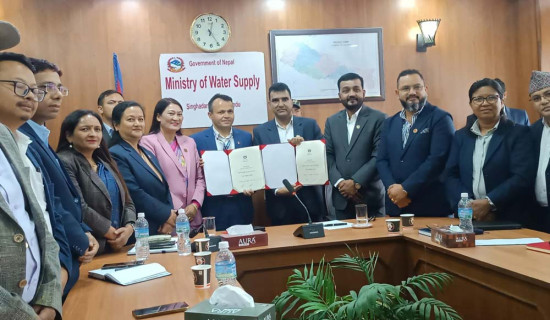- Friday, 9 May 2025
Clean Up Cooperatives
The government is trying to sort out severe financial troubles facing numerous cooperatives. According to chair of the Crisis-ridden Cooperatives Management Committee Kashi Raj Dahal, out of 32,000 cooperatives, only some hundreds are marred by mismanagement while twenty big ones are buffeted by serious crisis. We have various types of cooperatives such as savings and credit, multipurpose or those involved in activities related to agriculture, fruits and vegetable, beekeeping, tea and coffee, etc. Of those cooperatives, savings and credit cooperatives have been reeling from worse fiscal conditions because of bad governance, mismanagement and poor monitoring system.
Thousands of people, who deposited their hard-earned money in those big cooperatives have been hit hard. In most cases, the deposits of the general public are embezzled by the operators of the cooperatives which has tarnished the image of the 3rd pillar of economy. As a result, thousands of cooperatives victims have been staging protests in various parts of the country, demanding return of their deposits by the office-bearers of cooperatives as well as some other fraudsters.
Bearing in mind the demands of the depositors, the federal government is set to unveil an ordinance to this end but experts and former government officials have claimed that the ordinance is weak and unlikely to overcome the woes of the victims. President Ram Chandra Poudel, on the recommendation of the Council of Ministers, issued an ordinance to amend some Nepal laws on cooperatives in accordance with Article 114(1) of the Constitution of Nepal, 2015. If one reads the ordinance, s/he will find that it has contained strong measures aimed at protecting the interests of the depositors. It has envisioned a national cooperative regulatory authority which will regulate the savings and credits of the cooperatives and mandate the recovery of up to Rs. 500,000 of depositors each.
It will authorise the sale of the collateral in the cooperatives for the purpose of repaying the loans if a borrower fails to clear debt. Now, a cooperative can lease or sell the assets to pay back the savings of the clients. Likewise, transparency in the cooperative registration, classification of and ceiling of savings have been emphasised to make sure that the cooperatives do not whiten the black money amassed illegally.
Meanwhile, Minister for Land Management, Cooperatives and Poverty Alleviation Balaram Adhikari said that new provision of cooperatives regulatory authority will be an autonomous body which will work in coordination with the Nepal Rastra Bank. He said that the subordinate bodies of NRB will oversee the information centre and saving of the cooperatives. Similarly, the formation of cooperatives-related tribunal is a new concept that will help establish the cooperatives as the third pillar of economy.
We have too many laws and many provisions, but in the time of crisis, they seldom work properly. Therefore, an old saying, 'actions speak louder than words' is relevant in this case.
It seems that the depositors are too much naïve about the cooperatives running in their locality. The cooperatives do not have competent manpower and lack strict regulation. Investment of cooperatives in the unproductive areas is one of major factors behind the collapse of many cooperatives. The three-tier governments require effectively implementing laws, reward and punishment provisions in order to punish the swindlers and clear the mess of the cooperatives.

















